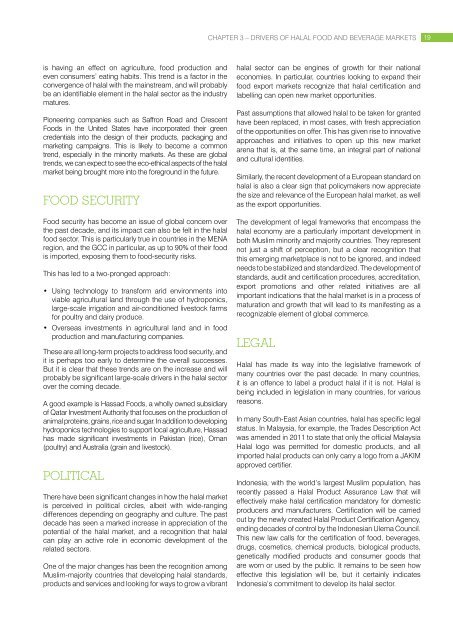Halal Goes Global
Halal_Goes_Global-web(1)
Halal_Goes_Global-web(1)
Create successful ePaper yourself
Turn your PDF publications into a flip-book with our unique Google optimized e-Paper software.
Chapter 3 – DRIVERS OF HALAL FOOD AND BEVERAGE MARKETS 19<br />
is having an effect on agriculture, food production and<br />
even consumers’ eating habits. This trend is a factor in the<br />
convergence of halal with the mainstream, and will probably<br />
be an identifiable element in the halal sector as the industry<br />
matures.<br />
Pioneering companies such as Saffron Road and Crescent<br />
Foods in the United States have incorporated their green<br />
credentials into the design of their products, packaging and<br />
marketing campaigns. This is likely to become a common<br />
trend, especially in the minority markets. As these are global<br />
trends, we can expect to see the eco-ethical aspects of the halal<br />
market being brought more into the foreground in the future.<br />
Food security<br />
Food security has become an issue of global concern over<br />
the past decade, and its impact can also be felt in the halal<br />
food sector. This is particularly true in countries in the MENA<br />
region, and the GCC in particular, as up to 90% of their food<br />
is imported, exposing them to food-security risks.<br />
This has led to a two-pronged approach:<br />
• Using technology to transform arid environments into<br />
viable agricultural land through the use of hydroponics,<br />
large-scale irrigation and air-conditioned livestock farms<br />
for poultry and dairy produce.<br />
• Overseas investments in agricultural land and in food<br />
production and manufacturing companies.<br />
These are all long-term projects to address food security, and<br />
it is perhaps too early to determine the overall successes.<br />
But it is clear that these trends are on the increase and will<br />
probably be significant large-scale drivers in the halal sector<br />
over the coming decade.<br />
A good example is Hassad Foods, a wholly owned subsidiary<br />
of Qatar Investment Authority that focuses on the production of<br />
animal proteins, grains, rice and sugar. In addition to developing<br />
hydroponics technologies to support local agriculture, Hassad<br />
has made significant investments in Pakistan (rice), Oman<br />
(poultry) and Australia (grain and livestock).<br />
Political<br />
There have been significant changes in how the halal market<br />
is perceived in political circles, albeit with wide-ranging<br />
differences depending on geography and culture. The past<br />
decade has seen a marked increase in appreciation of the<br />
potential of the halal market, and a recognition that halal<br />
can play an active role in economic development of the<br />
related sectors.<br />
One of the major changes has been the recognition among<br />
Muslim-majority countries that developing halal standards,<br />
products and services and looking for ways to grow a vibrant<br />
halal sector can be engines of growth for their national<br />
economies. In particular, countries looking to expand their<br />
food export markets recognize that halal certification and<br />
labelling can open new market opportunities.<br />
Past assumptions that allowed halal to be taken for granted<br />
have been replaced, in most cases, with fresh appreciation<br />
of the opportunities on offer. This has given rise to innovative<br />
approaches and initiatives to open up this new market<br />
arena that is, at the same time, an integral part of national<br />
and cultural identities.<br />
Similarly, the recent development of a European standard on<br />
halal is also a clear sign that policymakers now appreciate<br />
the size and relevance of the European halal market, as well<br />
as the export opportunities.<br />
The development of legal frameworks that encompass the<br />
halal economy are a particularly important development in<br />
both Muslim minority and majority countries. They represent<br />
not just a shift of perception, but a clear recognition that<br />
this emerging marketplace is not to be ignored, and indeed<br />
needs to be stabilized and standardized. The development of<br />
standards, audit and certification procedures, accreditation,<br />
export promotions and other related initiatives are all<br />
important indications that the halal market is in a process of<br />
maturation and growth that will lead to its manifesting as a<br />
recognizable element of global commerce.<br />
Legal<br />
<strong>Halal</strong> has made its way into the legislative framework of<br />
many countries over the past decade. In many countries,<br />
it is an offence to label a product halal if it is not. <strong>Halal</strong> is<br />
being included in legislation in many countries, for various<br />
reasons.<br />
In many South-East Asian countries, halal has specific legal<br />
status. In Malaysia, for example, the Trades Description Act<br />
was amended in 2011 to state that only the official Malaysia<br />
<strong>Halal</strong> logo was permitted for domestic products, and all<br />
imported halal products can only carry a logo from a JAKIM<br />
approved certifier.<br />
Indonesia, with the world’s largest Muslim population, has<br />
recently passed a <strong>Halal</strong> Product Assurance Law that will<br />
effectively make halal certification mandatory for domestic<br />
producers and manufacturers. Certification will be carried<br />
out by the newly created <strong>Halal</strong> Product Certification Agency,<br />
ending decades of control by the Indonesian Ulema Council.<br />
This new law calls for the certification of food, beverages,<br />
drugs, cosmetics, chemical products, biological products,<br />
genetically modified products and consumer goods that<br />
are worn or used by the public. It remains to be seen how<br />
effective this legislation will be, but it certainly indicates<br />
Indonesia’s commitment to develop its halal sector.


